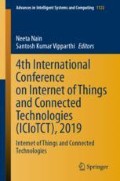Abstract
With the advancement of technology, negative bias temperature instability (NBTI) emerges out as a major problem for VLSI circuits. Meanwhile, the leakage power increases dramatically as the supply/threshold voltage continues to scale down. These two issues present extreme unwavering quality issues for CMOS devices. Since both the NBTI and leakage are reliant on input test vector of the circuit however input vector control strategy isn’t viable for bigger circuits. Thus in this paper two design is proposed (1) Single header Based Ultra low Power Diode Tri-mode Technique is designed for reducing leakage and delay of the circuit (2) Multi header Based Ultra low Power Diode Tri mode Technique with Body Bias on all sleep pMOS transistor to mitigate NBTI effect. Experimentations are done on 1 bit full adder circuit with the usage of tanner EDA at 90 nm CMOS technology node and supply voltage 1 V. The results reveal that by using first proposed technique leakage current is reduces by 74.93% and 0.217% respectively as compare to Stacking with delay based MTCMOS method and ULP diode based MTCMOS method. First proposed design is also effective in terms of delay. Result shows that delay get reduced by 20.91% and 7.84% as compare to prevalent techniques. Second Proposed design at 50% Duty cycle is very much effective for NBTI effect mitigation. Experimental result shows that Second Proposed design with reduction in duty cycle(from 100% to 50%) the Vth shift on pMOS transistor reduces and with this decrement in Vth of pMOS transistor NBTI effect on the circuit will get reduced.
Access this chapter
Tax calculation will be finalised at checkout
Purchases are for personal use only
References
Narendra, S.G., Chandrakasan, A.P.: Leakage in Nanometer CMOS Technologies. Springer Science & Business Media (2006)
Calimera, A., Macii, E., Poncino, M.: Design techniques for nbti-tolerant power-gating architectures. IEEE Trans. Circ. Syst. II: Express Briefs 59(4), 249–253 (2012)
Ravindra, N.M.: International technology roadmap for semiconductors (İTRS). J. Electron. Mater. 30(12), 1478–1627 (2001). Symposium
Pattanaik, M., Agnihotri, S., Varaprashad, M.V.D.L., Arasu, T.A.: Enhanced ground bounce noise reduction in a low leakage 90 nm 1-volt cmos full adder cell. In: 2010 International Symposium on Electronic System Design (ISED), pp. 175–180. IEEE (2010)
Deepaksubramanyan, B.S., Nunez, A.: Analysis of subthresh-old leakage reduction in cmos digital circuits. In: 50th Midwest Symposium on Circuits and Systems, 2007, MWSCAS 2007, pp. 1400–1404. IEEE (2007)
Roy, S., Liu, D., Singh, J., Um, J., Pan, D.Z.: OSFA: a new paradigm of aging aware gate-sizing for power/performance optimizations under multiple operating conditions. IEEE Trans. Comput.-Aided Des. Integr. Circ. Syst. 35(10), 1618–1629 (2016)
Arya, N., Singh, S., Pattanaik, M.: Temperature insensitive design for power gated circuits. In: 2014 9th International Conference on Industrial and Information Systems (ICIIS), pp. 1–6, December 2014
Sharma, S., Kumar, A., Pattanaik, M., Raj, B.: Forward body biased multimode multi-threshold cmos technique for ground bounce noise reduction in static cmos adders. Int. J. Inf. Electron. Eng. 3(6), 567 (2013)
Jiao, H., Kursun, V.: How forward body bias helps to reduce ground bouncing noise and silicon area in mtcmos circuits: divulging the basic mechanism. In: SoC Design Conference (ISOCC), 2010 International, pp. 9–12. IEEE (2010)
Calimera, A., Macii, E., Poncino, M.: NBTİ-aware power gating for concurrent leakage and aging optimization. In Proceedings of the 2009 ACM/IEEE İnternational Symposium on Low power Electronics and Design, pp. 127–132. ACM (2009)
Ren, P., Liu, C., Wang, R., Gong, N., Liu, J., Wu, H., Huang, R.: New understanding on the single-trap response under nbti stress and the resulted stochastic degradation in nanoscale mosfets. In: 2012 IEEE 11th International Conference on Solid-State and Integrated Circuit Technology, pp. 1–3, October 2012
Levacq, D., Dessard, V., Flandre, D.: Low leakage soi cmos static memory cell with ultra-low power diode. IEEE J. Solid-State Circ. 42(3), 689–702 (2007)
Author information
Authors and Affiliations
Corresponding author
Editor information
Editors and Affiliations
Rights and permissions
Copyright information
© 2020 The Editor(s) (if applicable) and The Author(s), under exclusive license to Springer Nature Switzerland AG
About this paper
Cite this paper
Kumar, A., Saraswat, S.K., Agrawal, P., Singh, S. (2020). Multi Header Based Ultra Low Power MTCMOS Technique to Reduce NBTI Effect in Combinational Circuit. In: Nain, N., Vipparthi, S. (eds) 4th International Conference on Internet of Things and Connected Technologies (ICIoTCT), 2019. ICIoTCT 2019. Advances in Intelligent Systems and Computing, vol 1122. Springer, Cham. https://doi.org/10.1007/978-3-030-39875-0_5
Download citation
DOI: https://doi.org/10.1007/978-3-030-39875-0_5
Published:
Publisher Name: Springer, Cham
Print ISBN: 978-3-030-39874-3
Online ISBN: 978-3-030-39875-0
eBook Packages: EngineeringEngineering (R0)

